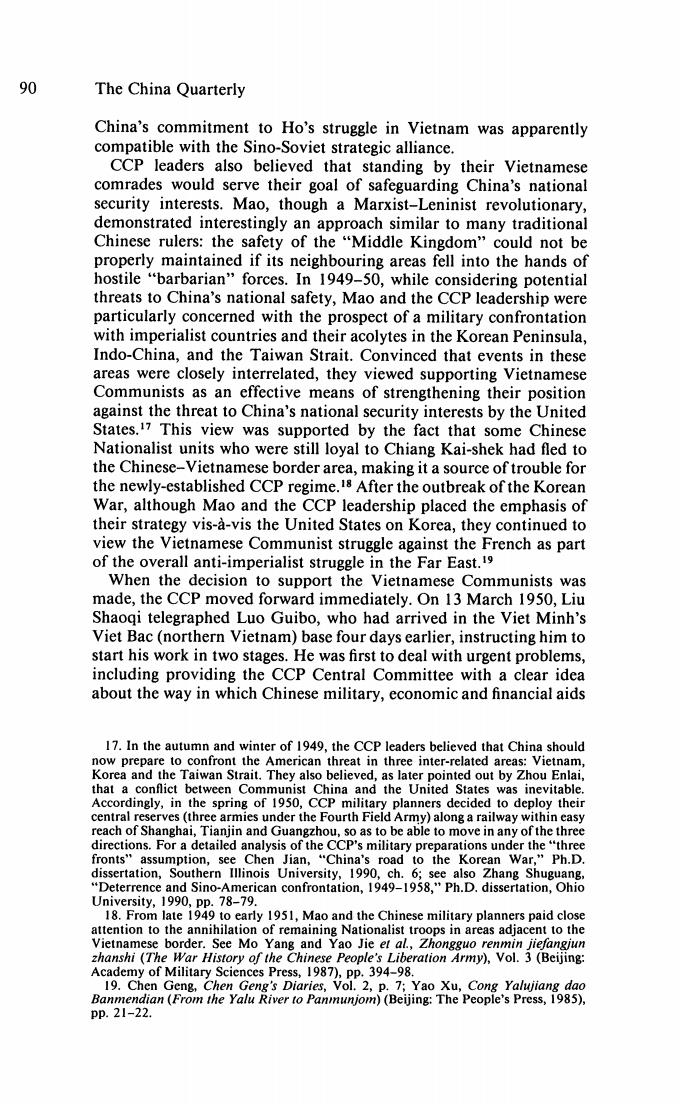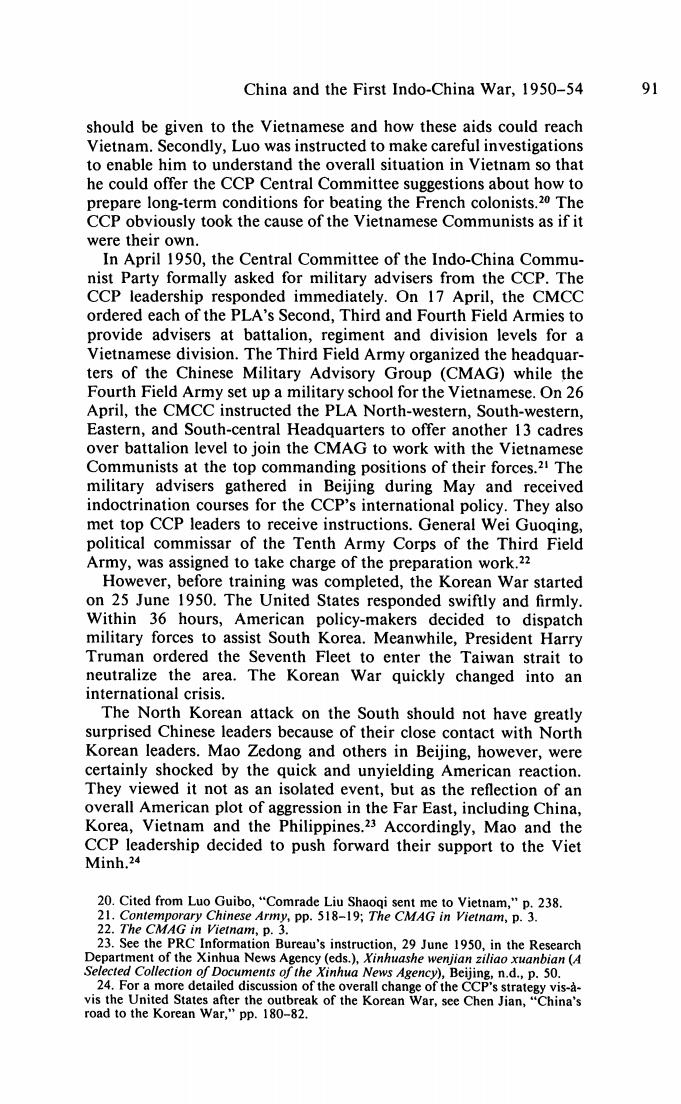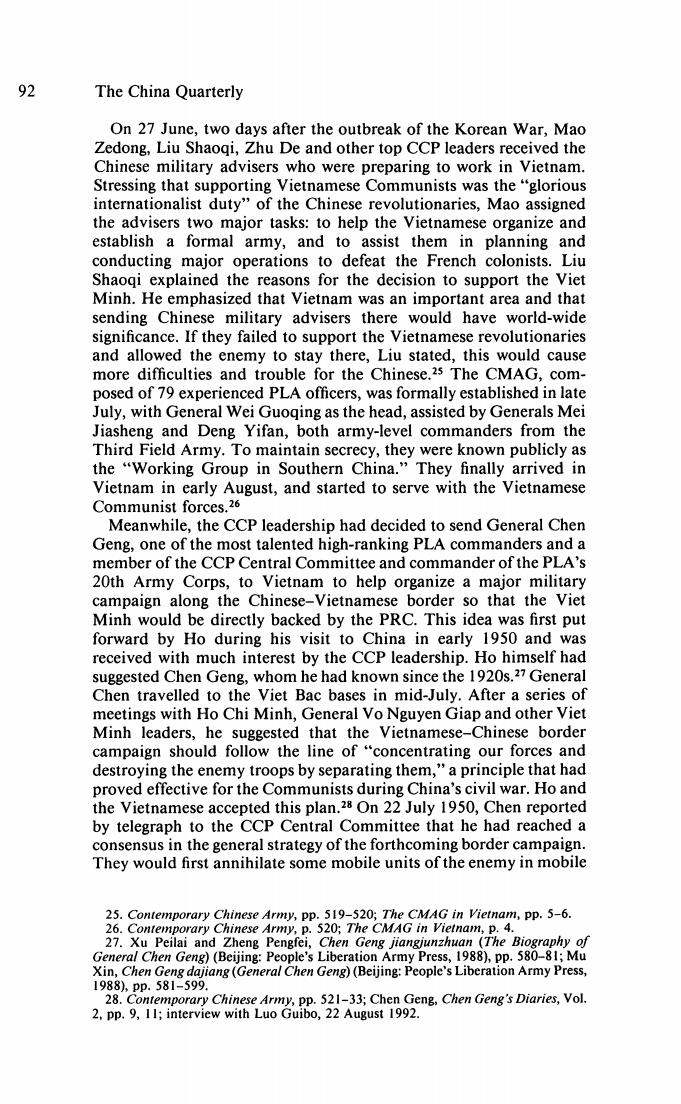
China and the First Indo-China War,1950-54 89 returned),promised that the CCP would do its best "to offer every military assistance needed by Vietnam in its struggle against France." When Ho returned to Vietnam he was certain that he could now rely on China's support.13 The CCP's attitude towards Vietnam was first and foremost the natural result of the Chinese Communist perception of an Asian revolution following the Chinese model.During the Chinese Commu- nist revolution,Mao and other CCP leaders had consistently seen it as part of a world proletarian revolutionary movement initiated by the Russian Bolsheviks.As it progressed,however,and differed from the Russian Revolution by concentrating largely on rural instead of urban areas,Mao and the CCP leadership had second thoughts on the nature and significance of their revolution.During 1948-49 they began to talk in terms of a much broader anti-imperialist Asian and world revolution.First,their model of revolution transcended China and offered an example of universal significance to other peoples struggling for national liberation.Secondly,the victory of the Chinese revolution represented the beginning of a new high tide of revolution movements of oppressed peoples in Asia and the world.Con- sequently,they believed it their duty to assist Communist revolution- aries and national liberation movements in other countries in order to promote an Asia-wide or even world-wide revolution.14 The CCP's policy of supporting the Vietnamese Communists was also consistent with Mao's "leaning to one side"approach,one of the corner-stones of the CCP's domestic and international policy in the early years of the PRC.Materials available now reveal that during Liu Shaoqi's secret visit to the Soviet Union in July and August 1949, Stalin strongly encouraged the Chinese to take a larger role in promoting revolutionary movements in East Asia.15 When Mao visited Moscow,the Chinese and the Soviets may have further divided the sphere of responsibility between them,leaving the support of Communist revolutionaries in Vietnam as China's duty.16 13.Huang Zheng,Ho Chi Minh and China,pp.125-26;Hoang Van Hoan,A Drop in the Ocean,pp.254-55;Contemporary Chinese Army.pp.520,576. 14.Liu Shaoqi,"Internationalism and nationalism,"Renmin ribao,7 November 1948;Liu Shaoqi's address on the Conference of Union of the Asian-Pacific region, Xinhua yuebao,No.2,Vol.1,p.440.See also Jin Zhonghua,"China's liberation and the world situation,"Shijie zhishi (World Afairs),Vol.20,No.1,17 June 1949;Du Ruo,"China's liberation and South-east Asia,"World Affairs,Vol.20,No.4,8 July 1949;"China's revolution and the struggle against colonialism,"People's China,16 February 1950,pp.4-5. 15.For a more detailed discusson of Liu Shaoqi's visit to Moscow,see Chen Jian, "The Sino-Soviet alliance and China's entry into the Korean War,"(Washington,D.C.: The Cold War International History Project of the Woodrow Wilson International Center for Scholars,December 1991),pp.9-15;see also Shi Zhe,"Random reflections of Comrade Liu Shaoqi,"Geming huiyilu(Revolutionary Memoirs),supplementary issue,No.I(October 1983),pp.110-11;Zhu Yuanshi,"Liu Shaoqi's secret visit to the Soviet Union in 1949,"Dangde wenxian (Party Historical Documents),No.3(1991), pp.76-77. 16.Interviews with Chinese researchers in May 1991;see also Li Ke,"Chinese military advisers,"p.27

90 The China Quarterly China's commitment to Ho's struggle in Vietnam was apparently compatible with the Sino-Soviet strategic alliance. CCP leaders also believed that standing by their Vietnamese comrades would serve their goal of safeguarding China's national security interests.Mao,though a Marxist-Leninist revolutionary, demonstrated interestingly an approach similar to many traditional Chinese rulers:the safety of the "Middle Kingdom"could not be properly maintained if its neighbouring areas fell into the hands of hostile "barbarian"forces.In 1949-50,while considering potential threats to China's national safety,Mao and the CCP leadership were particularly concerned with the prospect of a military confrontation with imperialist countries and their acolytes in the Korean Peninsula, Indo-China,and the Taiwan Strait.Convinced that events in these areas were closely interrelated,they viewed supporting Vietnamese Communists as an effective means of strengthening their position against the threat to China's national security interests by the United States.17 This view was supported by the fact that some Chinese Nationalist units who were still loyal to Chiang Kai-shek had fled to the Chinese-Vietnamese border area,making it a source of trouble for the newly-established CCP regime.18 After the outbreak of the Korean War,although Mao and the CCP leadership placed the emphasis of their strategy vis-a-vis the United States on Korea,they continued to view the Vietnamese Communist struggle against the French as part of the overall anti-imperialist struggle in the Far East.19 When the decision to support the Vietnamese Communists was made,the CCP moved forward immediately.On 13 March 1950,Liu Shaoqi telegraphed Luo Guibo,who had arrived in the Viet Minh's Viet Bac(northern Vietnam)base four days earlier,instructing him to start his work in two stages.He was first to deal with urgent problems, including providing the CCP Central Committee with a clear idea about the way in which Chinese military,economic and financial aids 17.In the autumn and winter of 1949,the CCP leaders believed that China should now prepare to confront the American threat in three inter-related areas:Vietnam, Korea and the Taiwan Strait.They also believed,as later pointed out by Zhou Enlai, that a conflict between Communist China and the United States was inevitable. Accordingly,in the spring of 1950,CCP military planners decided to deploy their central reserves(three armies under the Fourth Field Army)along a railway within easy reach of Shanghai,Tianjin and Guangzhou,so as to be able to move in any of the three directions.For a detailed analysis of the CCP's military preparations under the"three fronts"assumption,see Chen Jian,"China's road to the Korean War,"Ph.D. dissertation,Southern Illinois University,1990,ch.6;see also Zhang Shuguang, "Deterrence and Sino-American confrontation,1949-1958,"Ph.D.dissertation,Ohio University,1990,pp.78-79. 18.From late 1949 to early 1951,Mao and the Chinese military planners paid close attention to the annihilation of remaining Nationalist troops in areas adjacent to the Vietnamese border.See Mo Yang and Yao Jie et al.,Zhongguo renmin jiefangjun zhanshi (The War History of the Chinese People's Liberation Army),Vol.3 (Beijing: Academy of Military Sciences Press,1987),pp.394-98. 19.Chen Geng,Chen Geng's Diaries,Vol.2,p.7;Yao Xu,Cong Yalujiang dao Banmendian (From the Yalu River to Panmunjom)(Beijing:The People's Press,1985), pp.21-22

China and the First Indo-China War,1950-54 91 should be given to the Vietnamese and how these aids could reach Vietnam.Secondly,Luo was instructed to make careful investigations to enable him to understand the overall situation in Vietnam so that he could offer the CCP Central Committee suggestions about how to prepare long-term conditions for beating the French colonists.20 The CCP obviously took the cause of the Vietnamese Communists as if it were their own. In April 1950,the Central Committee of the Indo-China Commu- nist Party formally asked for military advisers from the CCP.The CCP leadership responded immediately.On 17 April,the CMCC ordered each of the PLA's Second,Third and Fourth Field Armies to provide advisers at battalion,regiment and division levels for a Vietnamese division.The Third Field Army organized the headquar- ters of the Chinese Military Advisory Group (CMAG)while the Fourth Field Army set up a military school for the Vietnamese.On 26 April,the CMCC instructed the PLA North-western,South-western, Eastern,and South-central Headquarters to offer another 13 cadres over battalion level to join the CMAG to work with the Vietnamese Communists at the top commanding positions of their forces.21 The military advisers gathered in Beijing during May and received indoctrination courses for the CCP's international policy.They also met top CCP leaders to receive instructions.General Wei Guoqing, political commissar of the Tenth Army Corps of the Third Field Army,was assigned to take charge of the preparation work.22 However,before training was completed,the Korean War started on 25 June 1950.The United States responded swiftly and firmly. Within 36 hours,American policy-makers decided to dispatch military forces to assist South Korea.Meanwhile,President Harry Truman ordered the Seventh Fleet to enter the Taiwan strait to neutralize the area.The Korean War quickly changed into an international crisis. The North Korean attack on the South should not have greatly surprised Chinese leaders because of their close contact with North Korean leaders.Mao Zedong and others in Beijing,however,were certainly shocked by the quick and unyielding American reaction. They viewed it not as an isolated event,but as the reflection of an overall American plot of aggression in the Far East,including China, Korea,Vietnam and the Philippines.23 Accordingly,Mao and the CCP leadership decided to push forward their support to the Viet Minh.24 20.Cited from Luo Guibo,"Comrade Liu Shaoqi sent me to Vietnam,"p.238. 21.Contemporary Chinese Army,pp.518-19;The CMAG in Vietnam,p.3. 22.The CMAG in Vietnam,p.3. 23.See the PRC Information Bureau's instruction,29 June 1950,in the Research Department of the Xinhua News Agency (eds.),Xinhuashe wenjian ziliao xuanbian(A Selected Collection of Documents of the Xinhua News Agency),Beijing,n.d.,p.50. 24.For a more detailed discussion of the overall change of the CCP's strategy vis-a- vis the United States after the outbreak of the Korean War,see Chen Jian,"China's road to the Korean War,"pp.180-82

92 The China Quarterly On 27 June,two days after the outbreak of the Korean War,Mao Zedong,Liu Shaoqi,Zhu De and other top CCP leaders received the Chinese military advisers who were preparing to work in Vietnam. Stressing that supporting Vietnamese Communists was the "glorious internationalist duty"of the Chinese revolutionaries,Mao assigned the advisers two major tasks:to help the Vietnamese organize and establish a formal army,and to assist them in planning and conducting major operations to defeat the French colonists.Liu Shaoqi explained the reasons for the decision to support the Viet Minh.He emphasized that Vietnam was an important area and that sending Chinese military advisers there would have world-wide significance.If they failed to support the Vietnamese revolutionaries and allowed the enemy to stay there,Liu stated,this would cause more difficulties and trouble for the Chinese.25 The CMAG,com- posed of 79 experienced PLA officers,was formally established in late July,with General Wei Guoging as the head,assisted by Generals Mei Jiasheng and Deng Yifan,both army-level commanders from the Third Field Army.To maintain secrecy,they were known publicly as the "Working Group in Southern China."They finally arrived in Vietnam in early August,and started to serve with the Vietnamese Communist forces.26 Meanwhile,the CCP leadership had decided to send General Chen Geng,one of the most talented high-ranking PLA commanders and a member of the CCP Central Committee and commander of the PLA's 20th Army Corps,to Vietnam to help organize a major military campaign along the Chinese-Vietnamese border so that the Viet Minh would be directly backed by the PRC.This idea was first put forward by Ho during his visit to China in early 1950 and was received with much interest by the CCP leadership.Ho himself had suggested Chen Geng,whom he had known since the 1920s.27 General Chen travelled to the Viet Bac bases in mid-July.After a series of meetings with Ho Chi Minh,General Vo Nguyen Giap and other Viet Minh leaders,he suggested that the Vietnamese-Chinese border campaign should follow the line of "concentrating our forces and destroying the enemy troops by separating them,"a principle that had proved effective for the Communists during China's civil war.Ho and the Vietnamese accepted this plan.28 On 22 July 1950,Chen reported by telegraph to the CCP Central Committee that he had reached a consensus in the general strategy of the forthcoming border campaign. They would first annihilate some mobile units of the enemy in mobile 25.Contemporary Chinese Army,pp.519-520;The CMAG in Vietnam,pp.5-6. 26.Contemporary Chinese Army,p.520;The CMAG in Vietnam,p.4. 27.Xu Peilai and Zheng Pengfei,Chen Geng jiangjunzhuan (The Biography of Genera/Chen Geng)(Beijing:People's Liberation Army Press,1988),pp.580-81;Mu Xin,Chen Geng dajiang(General Chen Geng)(Beijing:People's Liberation Army Press, 1988),pp.581-599. 28.Contemporary Chinese Army,pp.521-33;Chen Geng,Chen Geng's Diaries,Vol. 2,pp.9,I1;interview with Luo Guibo,22 August 1992